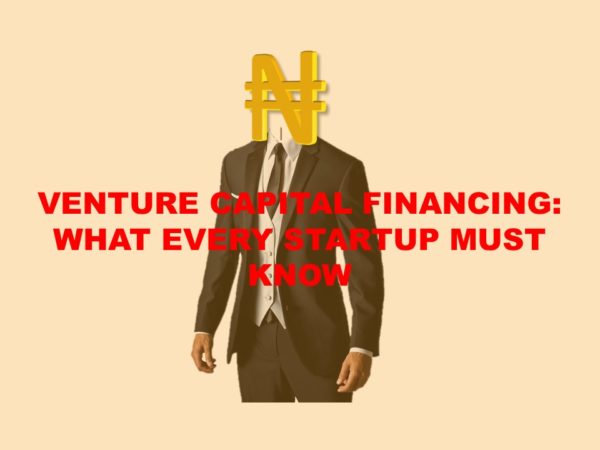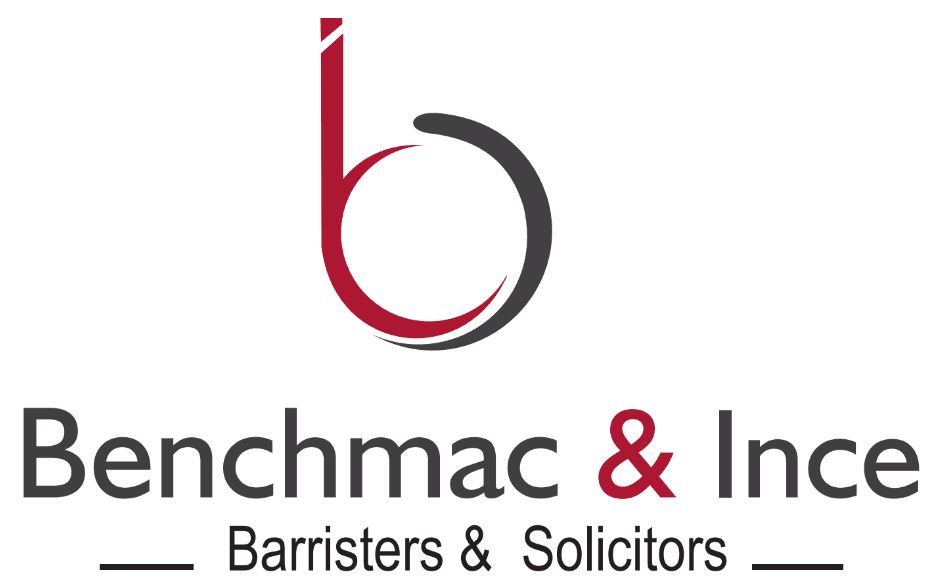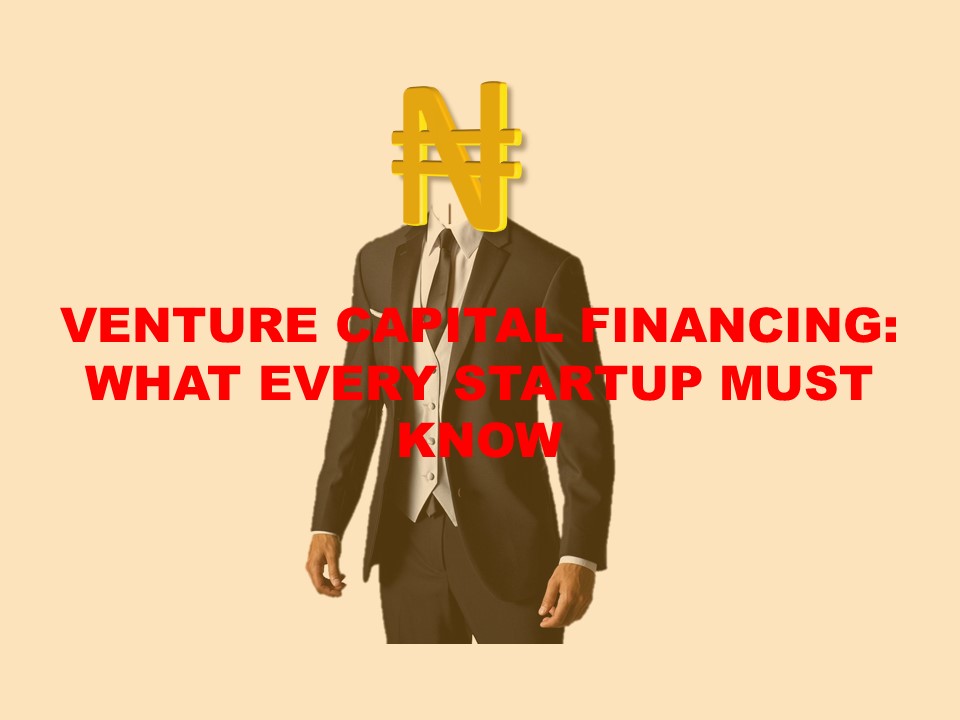
Venture capital funding has become very popular with startups seeking financing these days. The number of venture capitalist (VC) firms has continued to grow, with venture capitalist seeking startups having high-risks and potential for high-returns.
Venture capital financing are not easy to obtain or close, however, startups will be better positioned to obtain them if they understand the process, the anticipated deal terms, and the potential issues that will arise.
This article provides an overview of venture capital financing viz-a-viz what the concept means, why venture financing, the various types of venture capital funding out there and how to get venture capital funding.
WHAT IS VENTURE CAPITAL?
Venture capital is a form of private equity and a type of financing that investors provide to startup companies and small businesses that are believed to have long-term growth potential. This capital generally comes from well-off investors, investment banks and any other financial institutions.
The modus operandi of a VC is finding and investing in a solid business rather than equity. The goal is usually to get high return on investment (ROI) especially via an IPO or acquisition of the business they have invested in, so it is not uncommon to see them pull out and seek other investments once the startup has been acquired or has gone public.
Because of the goal of getting high returns, VCs favour more of technology companies. More so, VCs tend to invest in a few industries where their domain expertise is strongest so as to ensure that they see to the success of the business by also contributing their technical expertise and skills.
Unlike a bank that takes all interested customers, VCs tend to be far more selective in who they take pitches from. Oftentimes they take pitches based on the recommendation of other professionals in their network or from entrepreneurs whom they have funded in the past.
WHY VENTURE CAPITAL FUNDING?
VC funding is a great option for startups that are keen on scaling quickly. This is so because the investments are fairly large. However, before taking up that capital, startups must understand the pros and cons of VC financing.
Pros
- Arguably, one of the biggest advantages of working with VCs is that if your startup goes under — as most do — you’re not on the hook for the money because unlike a loan, there’s no obligation to pay it back.
- Also, owing to their business and institutional knowledge and experience, VC provides valuable information, resources, strategic and technical assistance to make a business successful.
Cons
- Venture capitalists will remain loyal to your business until they have recovered their capital and profits. This usually occurs during a slim three to five-year timeframe. In other words, VCs invest in startups with an exit strategy in mind.
- Most VCs usually get to take a majority or controlling shareholding in the business they invest in. Hence, startup founders, tend to lose control and ownership of such business.
- The process of securing VC funding can be expensive. This is so because apart from money spent in setting up meetings with a VC, the negotiation and due diligence process will also take up funds. The Startup may need to hire the services of professionals like lawyers and accountants and these services can be costly and are usually paid for from the investment capital.
- Also, because VC invests with an exit plan in mind, it may not be a wise option for any founder that intends to run his startup over a long haul to go into VC financing.
TYPES OF VENTURE CAPITAL FUNDING
The three principal types of venture capital are early-stage financing, expansion financing and acquisition/buyout financing. This classification is based on the stage at which the financing is required by the startup.
- Early Stage Financing
Just as the name implies it is the first stage of financing. This stage financing has three subdivisions Pre-seed financing, seed financing and first stage or Series A financing.
The Pre-seed funding is usually the first funds raised by startups in order to get them to the point where they can raise a traditional seed round.
The Seed funding, on the other hand, is used to take a startup from idea to the first steps, such as product development or market research.
In the first stage (Series A) financing, startups are expected to have a plan for developing a business model, even if they haven’t proven it yet. They’re also expected to use the money raised to increase revenue. Because the investment is higher than the seed round investors are going to want more substance than they required for the seed funding, before they commit
- Expansion Financing
Expansion financing also known as second-stage financing has two sub-divisions – series B and Series C. Funding at this stage is usually to help the startup or company to enter new markets or increase their marketing efforts.
Particularly, companies that make it to the Series C stage of funding are doing very well and are ready to expand to new markets, acquire other businesses, or develop new products. Series C companies are looking to take their product out of their home country and reach an international market. They may also be looking to increase their valuation before going for an Initial Public Offering (IPO) or an acquisition.
- Acquisition or Buyout Financing
At this stage, the startup is looking for a partner to help find a merger or acquisition opportunity, or attract public financing through a stock offering. There are VCs that focus on this end of the business spectrum, specializing in initial public offerings (IPOs), buyouts, or recapitalization. A VC at this stage may also assist with mezzanine or bridge financing – short-term financing that allows a startup to pay for the costs associated with going public.
HOW TO SECURE A VENTURE CAPITAL FUNDING
It is tenable to say that securing investment is very crucial to the growth of any startup, but in securing funding from VCs, such startup must show that it prepared and investment ready. The easiest way to demonstrate that one is investment ready is to build strong and effective plans and forecast by taking the following steps below.
- Do a Background Check
The very first step is to do a background check to see whether the VC’s focus aligns with one’s startup. This is so because it is usual to see VCs focus their investments along the lines of; industry or sector of the startup, the stage of the company and geographical location etc. while this check may be time-consuming, it helps a founder to avoid the stress of having to contact too many people and get rejections.
- Approach the Venture Capitalist or Firm
VC in most occasion rely on their network in meeting startups. Hence in approaching a VC, the startup should consider checking with people they know who might know them (VC), alumni relationships, business associations, their public speaking dates, and any contacts in the companies in which they’ve already invested.
While it is true that some VCs will take pitches from an unsolicited source, one has higher chances if they get a warm introduction through a credible resource.
- Have your elevator pitch ready.
When sending an elevator pitch to a VC, the startup must be careful to ensure that it is not sending a sales pitch. Hence, the elevator pitch should summarily identify a market problem, provide solutions and show how big of a market there is for that solution. One should also be able to describe the business in a sentence or two and that sentence has to be intriguing – in other words, get a good tag line.
- Have your Pitch deck ready.
Most times after seeing your elevator pitch, the VC will request for a pitch deck. The pitch deck presentation should provide an overview of the business. The deck can share insights about your product or service, business model, market opportunity, company funding needs and your management team.
A pitch deck should be short, concise and cover the following elements:
- Management team
- Market pain point and solution
- Company progress
- Investment amount
- Company financials
- Master and Negotiate the term sheet
The term sheet has been described as the first real piece of paper a founder sees from a VC when they decide that they’re interested in investing. It is usually a non-binding document listing the preliminary terms for VC financing.
Because the term sheet is non-binding, it is not a guarantee that the VC will invest, however, it signals that the VC is serious about investing in the startup and wants to finalize due diligence and prepare a definitive legal investment document.
The term sheet usually covers matters of funding, corporate governance, liquidation and exit. Again, while this document is non-binding, it has always been an important document to negotiate with investors. Startups are always advised to think of the term sheet as the blueprint for the relationship with a prospective investor and be sure to give it plenty of attention.
- Initiate the Due Diligence Phase
When the VC is intrigued by your presentations and becomes interested in your business, the next phase is usually the due diligence checks. At this stage, all of the research and support you’ve put together will be put to test. They’re likely going to ask the startup to prove how it arrived at some of its variations and conclusion.
One way of fast-tracking this process is for the startup to initiate it. Hence, things like valuation checks, assets evaluation, financial statements and a number of processes which the startup can initiate first-hand to expedite the deal should be done. More so, because the venture capital process involves a lot of checks and balances, investors tend to like startups who have already done some part of the work, or know how to do it.
OTHER FINANCING OPTIONS FOR STARTUPS
Apart from VC financing, there are other means by which startups can get funding for their business and they include:
- Crowdfunding
- Bootstrapping
- Business incubators and accelerators
- Small business loan
- Government and non-government grants
- Private investors
- Angel investors etc
It important to state the whole process of securing VC financing can take a lot of time, however, understanding the process and doing the needed research can shorten that process a bit. In addition to the foregoing, a startup seeking VC funding will also need to be patient, not over expectant, forward-thinking and endeavour to use an experienced legal advisory firm for their legal due diligence and having their structure investment ready.
The opinions in the articles are for general information purposes only and do not form a legal relationship or be taken as legal advice. To explore legal advice, please consult your solicitor or feel free to get in touch with us directly.


